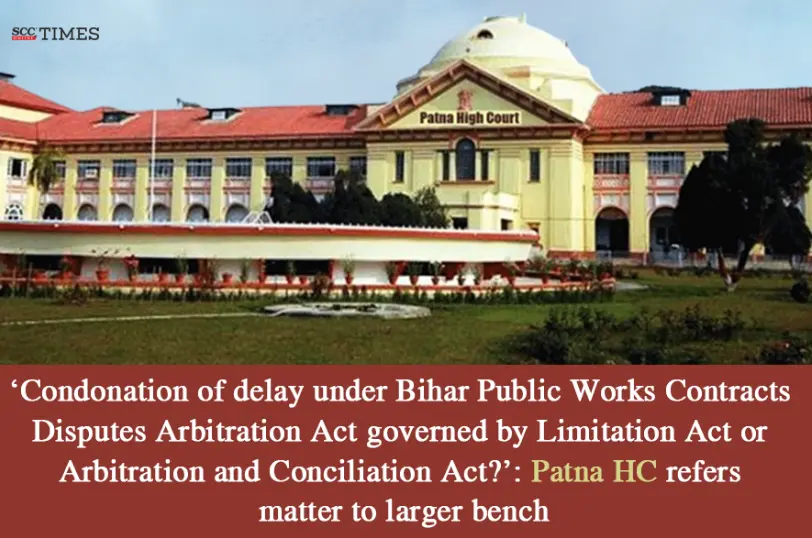Patna High Court: In civil revision applications filed by the respondents challenging the awards passed by the Bihar Public Works Contract Disputes Arbitration Tribunal which were filed after more than ten months from the date of the Award, a Single-Judge Bench of Ramesh Chand Malviya, J., referred the matter to a larger bench of that whether Section 5 of the Limitation Act shall have an application for condoning delay in a proceeding under Section 13 of the Bihar Public Works Contracts Disputes Arbitration Act, 2008 (‘BPWCDA Act’), or the condition of delay as laid down under Section 34 of the Arbitration and Conciliation Act, 1996 shall be applicable, in view of Section 8 of the BPWCDA Act.
Background
The respondent filed present civil revision applications against various awards passed by the Bihar Public Works Contract Disputes Arbitration Tribunal. The applications were filed after more than ten months from the date of the awards. The period of limitation for a civil revision application against an award is three months under the Limitation Act, 1963 and there is no upper limit prescribed for filing such an application under the BPWCDA Act. The petitioners contended that the provisions of Section 5 of the Limitation Act, 1963 were applicable to the proceedings under the BPWCDA Act and the present civil revision applications were not maintainable.
Analysis and Decision
The Court noted that the Arbitration and Conciliation Act, 1996, was enacted to consolidate and amend the laws relating to domestic arbitration, international commercial arbitration, and enforcement of foreign Arbitral awards as also to define the law relating to conciliation and for matters connected therewith or incidental thereto. Further, section 8 of the BPWCDA Act states that its provisions are ‘in addition to and supplemental to’ the Arbitration and Conciliation Act, 1996, and in case of conflict, the latter shall prevail.
The Court noted that there was no conflict in the present cases regarding the delay of more than ten months. Section 34(3) of the Arbitration and Conciliation Act, 1996, explicitly states that an application for setting aside an arbitral award have to be made within three months of the award and that the court may entertain it for a further period of thirty days, but not thereafter. Section 13(1) of the BPWCDA Act provides for a three-month limitation for an aggrieved party to file a revision but does not contain the phrase ‘but not thereafter’.
The Court noted that in State of M.P. v. Anshuman Shukla, (2014) 10 SCC 814, the Supreme Court held that in the absence of an express rider, the provisions of Section 29(2) of the Limitation Act are applicable, thereby allowing for the condonation of delay under Section 5. Further, in My Preferred Transformation & Hospitality (P) Ltd. v. Faridabad Implements (P) Ltd., (2025) 6 SCC 481, the Supreme Court held that the legislature should not restrict the period for condoning delay and should follow the principle of Section 5 of the Limitation Act.
However, in Union of India v. Popular Construction Co., (2001) 8 SCC 470, it was held that the scheme of the Arbitration and Conciliation Act, 1996, implies the exclusion of Section 5 of the Limitation Act.
The Court noted that,
“The mere prescription of a period of limitation that is different from the Limitation Act, even if mandatory and compulsory, is not sufficient to displace the applicability of the Limitation Act’s provisions. However, an exclusion can be inferred if the nature and language of the provisions, and the scheme of the special law necessarily exclude the applicability of one or more of the provisions contained in Sections 4 to 24 of the Limitation Act. Section 34 (3) of the Arbitration and Conciliation Act, 1996 clearly states that the application may be entertain within a period of 3 months extended by thirty days but not thereafter whereas Section 13 of the BPWCDA Act, 2008 states that application made to it within three months and it does not clearly exclude the same as it is in addition to and supplemental to Arbitration and Conciliation Act, 1996.”.
The Court observed that the provisions of Section 5 of the Limitation Act, 1963 is applicable to the revisional power of the High Court under Section 13 of the BPWDCA Act, 2008. However, the Court in view of the conflicting opinions of the co-ordinate benches framed the issue to be examined by a larger bench-
‘Whether Section 5 of the Limitation Act shall have an application for condoning delay in a proceeding under Section 13 of the BPWCDA Act, 2008, or the condition of delay as laid down under Section 34 of the Arbitration and Conciliation Act, 1996 shall be applicable, in view of Section 8 of the BPWCDA Act, 2008?’
Accordingly, the Court directed that the records of the cases be placed before the Chief Justice for consideration on the desirability of referring them to an appropriate larger bench.
[State of Bihar v. Dayanand Prd Sinha, 2025 SCC OnLine Pat 2692, decided on 25-08-2025]
Advocates who appeared in this case:
For the Petitioners: Ashok Kumar Dubey, Ac to AAG-XI, Dinesh Maharaj, AC to AAG-XI
For the Respondents: Lal Babu Singh, Nilesh Kumar Pandey, Advocates



